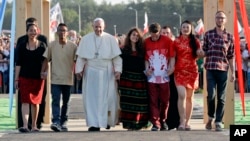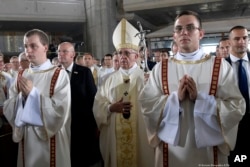Pope Francis condemned the "devastating wave of terrorism" and war that has hit the world as he neared the end of his visit to Poland late Saturday, and he urged a huge crowd of young people pray for Syria and other places in conflict.
The pope was in Krakow, Poland's second-largest city and a center of Catholicism in the country, where John Paul II served as a cardinal before he became the first non-Italian pope in centuries.
Before celebrating World Youth Day with hundreds of thousands of young Catholics in an enormous park near the center of the city, Francis made an unscheduled stop at one of Krakow's churches to recite a prayer for peace:
"Touch the hearts of terrorists," the pope prayed, "so that they may recognize the evil of their actions and may turn to the way of peace and goodness ... regardless of religion, origin, wealth or poverty."
Listening to young people tell stories of struggle, conflict and redemption later at the World Youth Day gathering, Francis heard a young representative from war-torn Aleppo in Syria ask: "God, where are you? Do you exist?"
In response, the pope asked everyone to pray for Syria. He urged young people from peaceful and prosperous places not to remain distant from the suffering of others. "The times we live in do not call for young 'couch potatoes,' " he told his young audience.
'Open doors to the heart'
Earlier Saturday, the pope addressed Polish nuns, priests and bishops, asking them to live simple lives, shun worldly ambitions and focus on those in need. All Catholics, he added, should leave their "comfort zones," be attentive to the needy and "open doors to the heart."
Francis spoke at a shrine to the memory of John Paul II, built on the site of a stone quarry where Nazi German occupation forces forced young Karol Wojtyla, the future pope, to work during World War II.
John Paul became one of the most popular and widely traveled Roman Catholic leaders during his time at the Vatican, from 1978 until his death in 2005, and he remains a national hero in his homeland. Many Poles see the pope's moral leadership as a decisive factor in the nation's rejection of communist rule in the 1980s.
Pope Francis, 79, will return to Vatican City on Sunday. He has had a busy schedule in Poland since Wednesday — celebrating Mass each day before large congregations; meeting with Polish political leaders, clergy and many ordinary Catholics; and also paying a somber visit to the former Nazi death camp at Auschwitz.
Auschwitz, preserved as a memorial to the Nazis' victims — more than a million people at the camp, most of them Jews — is in southern Poland, not far from Krakow and the small city of Wadowice, John Paul's birthplace.






